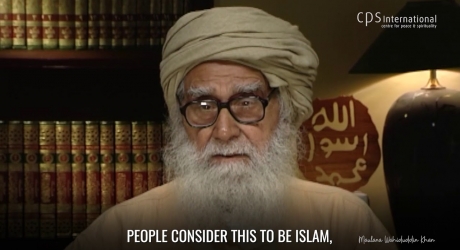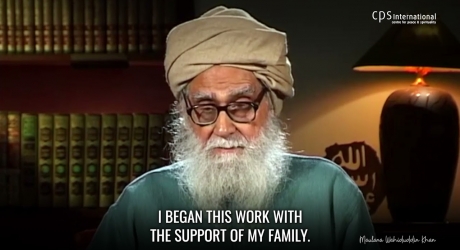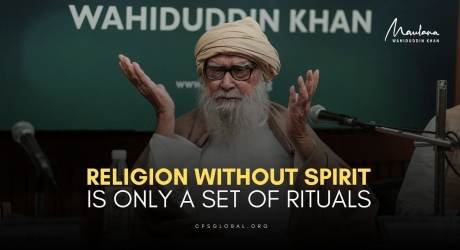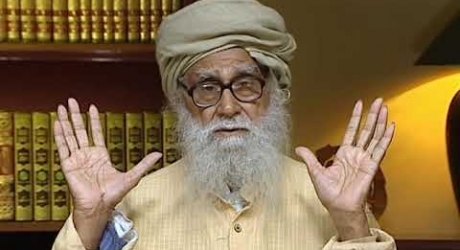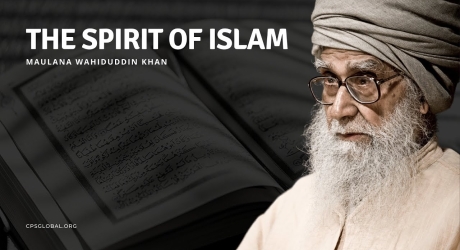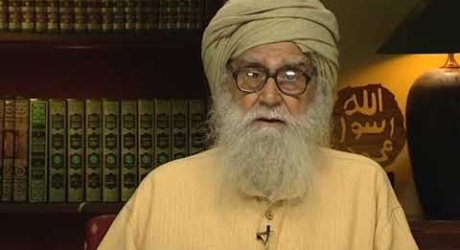What is degeneration? Degeneration is simply a kind of detachment. When people forget the original message of Islam and cling merely to some lifeless rituals—that is the sign of degeneration. At such times Muslims need to revive their faith, to rediscover the living ideology of Islam and to re-awaken their minds along the lines which were followed by the Prophet and his Companions. It is this act which is called in the Hadith (saying of the Prophet) tajdeed, or revival. The process of tajdeed cannot be successful if the reformers only want to revive the ritualistic form of Islam. The above example of the barren land tells us that the starting point for reform is intellectual awakening and not just the revival of ritualistic practices.
Moreover, the task of revival needs a creative approach, entailing the use of the contemporary idiom; reformers should try to sense their listeners’ moods and preach in such a manner that their minds may be addressed. If people’s minds are not addressed, then no reform movement will yield any positive results.
Introduction
Tajdeed-e-imaan refers to revival of faith. According to a verse in Quran,
Believers, believe in God and His Messenger (4:136)
As a principle, it must be understood that the Quranic verses have an immediate application and a greater application. To understand the greater application of the verse, the reader must extract himself from the immediate reference. As per the description in the commentaries, the above verse was revealed under specific circumstances. According to a Hadith tradition,
Apne imaan ke tajdeed karo (Musnad Ahmad) (Revive your faith)
Revival of faith is a critical aspect of Islam; else it reduces to a ritual. In the words of another Hadith Imaan bosida ho jata hai, to tum Allah se dua karte raho ke tumhare imaan ko dobara zinda kar de (Al-Jamiul Sahih) (Faith becomes worn out like cloth so you have to revive it again and again)
Apne imaan ki tajdeed karo, la ilaha –ill-allah keh kar (Musnad Ahmad)
(Revive your faith by pronouncing that there is no god but One God)
The above alludes to an important principle - it is the spirit of the faith which wears out and not its form. That is, the words do not get affected as time passes and the discharging of kalimah continues as it was but it is actually the spirit which wears out. This wearing out can only be addressed by continuing the process of reviving one s faith.
Man is the subject of psychology. Modern psychology has revealed that the human mind is divided into –conscious (shaoor), sub-conscious (tahat-e-shaoor) and unconscious (la-shaoor). When a thought originates in the human conscious mind, it stays in active memory till before he sleeps. When man sleeps (his conscious mind is in slumber) his sub conscious mind is involved in the process of sorting out thoughts.
At this time, the thought gets transferred from the conscious to the sub conscious mind. Unless revived, this thought will be permanently sent to the unconscious mind and become difficult to retrieve.
A man overwhelmed by God s blessings and greatness, utters words of thanksgiving and gratitude in the morning. These words stay in his conscious memory as thoughts until he sleeps. During sleep, the thoughts travel from the conscious to the subconscious mind and if no mention is made of it again, all these thoughts are cast into the abyss of the unconscious mind where they cease to be a source of inspiration anymore. This phenomena has been explained in the Hadith above according to which faith must be revived again and again so that it continues to incentivize.
How can faith be revived?
God has blessed man in innumerable ways. Man keeps forgetting the blessings as the days go by and the intensity of thankfulness fades away in his memory. It is therefore required that these blessings of God be recalled and remembered. Let me take a personal example. I was imbued with missionary spirit as a youth but I had no base. I arrived in Delhi in 1967 but had nothing on the basis of which my mission could be worked out. It was in 1983 that I got the present building and infrastructure to actively begin my mission of creating prepared minds. I was referred to as a “lonely voice” in publications, which was true for my initial days in Delhi but today, we have successfully prepared minds to tread the path of peace and spirituality. Without this base, I would not have been able to run a mission.
For example, let us re-read the verse mentioned below by replacing “qital” with “dawah”.
God was enough to [protect] the believers in battle [dawah work] (33:25)
This verse gives the glad tiding that God would suffice to run the dawah mission at an international scale. This evokes renewed conviction in divine succor towards completion of this task.
Today, I was listening to the radio and came to know that the waters of River Ganga have become so polluted that they are no longer palatable. To carry out its purification, government has laid down a 70 billion rupees plan. I thought that even my bloodstream is like Ganga but there is a natural process of purification, which governs its cleansing. If this does not happen and the bloodstream gets polluted, man will die. But God does not charge a single penny for this process. Thus, if man opens his eyes to God s glorious blessings and miracles as seen in creation, it becomes a source of revival of his faith.
Each day, am fascinated to think how one person speaks and another listens. It begins with an idea springing in a person s mind, which he transmits using words. These words fall upon the listener s ears and his mind translates it into thought within fraction of seconds. In the smallest spot in man s mind an extraordinary number of interactions takes place.
The tree in my balcony that I fondly refer to as the “spiritual tree” had become barren during the autumn season. It seemed it will never bear green leaves again. But today, it stands flourished. This experience became a source of revival of faith for me. These examples teach us that we may use fresh experiences and our thinking ability to revive our faith. If it remains at the level of lip service, the imaan becomes dead.
Higher imaan
Mere belief does not translate faith into a big faith. Rendering the kalimah as a matter of lip service, does not suffice. Faith must become a constant source of God-realisation. But even constant thinking and contemplating does not convert faith into higher faith. For this to happen, faith must become a mission. The spirit of a mission challenges the mind of man and leads him to stronger conviction and higher imaan. Faith without challenge is baseless as it takes away incentive from man.
The mission of a dayee is to share his discovery and realization with other men. This thought revolutionizes the entire life style of man.
People quit jobs because of lack of challenge. The same applies in the case of imaan (faith). If man s faith gives him some words to chant, it leads to smaller imaan; however if it gives him a mission, it becomes higher imaan. It is to develop an understanding of the concept of higher imaan that Quran stresses on contemplation and reflection. Reading the translation alone, allows understanding of a small part but thinking opens the door to a great world of meanings.
Starting point
The starting point of imaan is seeking spirit. Before becoming a believer, man must become a seeker. But if you stop at the kalimah, the imaan does not develop.
There was a multi-lingual Bengali Doctor of Philosophy, Nishi Kant Chattopadhyaye, who, having first studied philosophy, then all major religions, faced intellectual confrontation with different faiths.
Finally he made an intellectual discovery, in consequence of which he left his ancestral religion,
Hinduism, in favour of Islam. He delivered a lecture, published later under the title, “Why I Have Embraced Islam,” which describes in detail the story of his intellectual development.
He studied the major religions of the world but his seeking spirit did not get an answer. In his words, God is my witness, I have accepted Islam in all sincerity and earnestness, and the first reason that has moved me to do so is its solid, historical groundwork. After wandering helplessly for several years, in the marshy bogs of divergent creeds and conflicting systems of philosophy…..my weary soul has at last found refuge and consolation in a religion based Revelation that has remained unaltered ever since its first compilation first Caliph, and in a creed that acknowledges as its Prophet of God, one whose historical personality is not only unquestionable but also whose youth, appearance, daily habits and even personal characteristics, we know almost as much as we do about Oliver Cromwell or of Napolean Bonaparte.
Professor Chattopadhyaye goes on to write
Oh! what a relief to find, after all, a truly historical Prophet to believe in.
Unfortunately, the Muslim environment of Hyderabad stressed much on form and it cut the Professor from his intellectual pursuits. No one told him that Islam is a mission and does not come to halt at kalimah.
Having Imaan therefore is not sufficient. After man discovers, he yearns to pass his discovery on to others. Such a spirit makes man a giver in the society and the others become takers, which transform faith into a revolutionary imaan. Lack of mission kills the imaan.
How does mission present a challenge?
During my visit to Lucknow in year 1965, I met a secular learned man who asked me a question that ”left me speechless. He said, “If Muhammad is deleted from history, what would fall short in it?
Born and brought up in a Muslim environment, such a question came as a shock to me. No one had ever raised such a point. In order to find its answer, I began intensive study and continued it for many years. My study culminated in a book entitled, “Islam the Creator of Modern Age,” which answers the role of Prophet Muhammad in the history of development. This book materialized only because my mind was challenged; else I would never have published a book of this nature.
If man accepts faith as a set of beliefs, it does not revolutionise his life. If on the other hand, he accepts it as a mission; his life undergoes a complete transformation and serves as a booster to his faith.
The first stage in man s spiritual quest is that he becomes a seeker and starts searching for truth. Once man discovers the truth and brings imaan, he must not keep it up to lip service. Through contemplation and reflection, the discovered faith must become realization, which is the next level of imaan.
Then if this faith becomes a mission, it proffers before man a challenge that becomes a constant source of his intellectual development.
Dawah mission
At a stall erected in Jammu and Kashmir, a Hindu was offered a copy of the Quran. He did not take the Quran and quietly went away. After some time, he returned, t his time in different clothes. As he approached the stall, he requested the stall-keeper to give him the Quran. Confounded the stall-keeper asked why he did not accept it the first time, the man replied that he had not had his bath so he went back home, bathed, changed clothes and came back to take the Quran.
The present world has changed dramatically. Earlier every person lived in his shell but today, we witness unprecedented openness in the minds of people. Globalization has opened doors to missionary work. Everyone wants to know more and more about everything.
I appeal to each one of you to give a deep thought to life s occurrences. A new person must emerge from within you, each day. The physiology of human body is such that there exist millions and billions of living cells in it. The cells disintegrate on a daily basis but this process is not visible to the naked eye. This replacement of cells indicates that man s body becomes new everyday; the same should be the case of his mind. Just as he gets renewed in terms of physical existence, man must renew his intellectual existence.
The physiological replacement of cells is an automatic life process and does not require man s intervention. On the contrary, intellectual replenishment can only be done by man so that a new man person emerges from within him. Doing so has a direct bearing on the quality of dawah work because the better the intellectual personality of a dayee, the bigger the missionary work which he would be able to accomplish. Man s intellectual development is directly related to his thinking ability; the more he thinks the higher his intellect would be.
One is the classic literature -Quran, Hadith, Seerat and life of the Companions; the other is literature which is made available through CPS. The latter provides an understanding about the application of Islam in modern times.
Life is short and we can die anytime. Yesterday, a renowned political figure, Mr. Vasath Sathe passed away. He was exactly my age and today while he is no more, am speaking still. In other words, time at hand is so less that it must be availed without a moment s loss.
May God give us the ability to renew our faith!
Question- Answers
Q1: Please clarify the following Hadith tradition of Ibn-e-Maja:
Jo insaan jo apne tamam ghamon ko ek gham bana le yaani aakhirat ka gham, allah uske duniyavi ghamon ke liye kaafi ho jayega [He who makes hereafter as his life’s only concern, then for such a person God will suffice to overcome his worldly concerns].
A: The word gham in the context of the above Hadith means “concern”. To make hereafter, your sole concern does not mean that a person may start leading the secluded life of a hermit. It means that when conviction grows very strong, it becomes a mission. In other words, concern of hereafter assumes paramount importance for such a person and he casts himself to achieve his mission. Now the question arises that if he casts his energies into his concern for the hereafter, how his material needs will get fulfilled. The above Hadith is the assurance that if a person actually casts himself for the achievement of the goal of hereafter, God will suffice to fulfill all his worldly requirements. This does not include those who would merely “say” that they want to make hereafter their mission and seek fulfillment of their worldly requirements from God; doing so is like putting the cart before the horse. Man is required to first cast himself for the cause and then pray for God s help.
Q2: How should we do tajdeed-e-deen (revival of faith) in such a busy life?
A: Busy life is not a restriction for reviving man s faith. The same “ busy” life has items that may become a source of revival. Man does not have to go to jungle to revive his faith, it must be done in his active life. Whatever happens in our life – even material occurrences – can be made a source of reviving your faith; the only condition being intellectual awakening.
Q3: Please explain the following verse of the Quran:
Everyone in the heaven and on the Earth entreats Him. Every day He manifests himself in a new state. Which of your Lord’ s wonders would you deny?(55:29)
A: As per a school of thought, it was believed that God created the world (Prime Mover) and the world has sustained since then. Countering this point of view, the above verse says that God is the Creator and the entire universe is within the realms of His active control. Let me explain this with an example. An American space satellite recently, became defunct. Due to gravitational attraction, the satellite took the course southwards and was headed for a crash on the Earth s surface. It was like a big bus and its fall would have completely destroyed human habitation at the site of crash. While the space centres remained intrigued as to where it will fall, the satellite made its course and fell in the ocean. This is a small example of how God is actively managing human history.
Q4: During dawah activities, seemingly intelligent people turn out to be insincere and pose irrational questions. How to continue in this manner?
A: In such a situation a dayee must try to understand where the bias of the madu lies. According to my understanding, all men are prey to a biased approach of thinking because of their conditioned mindsets. When such a person encounters a view which is opposed to his pre -conceived notions, he reacts and may even talk illogically to defend his idea. A group of my companions teach at a seminary in South India. After much interaction, they had hopelessly concluded about a colleague that his stubborn nature and conditioned mind will never allow him to understand the Al-Risala mission. But gradually, he underwent a change of mind and now he is one of the most active propagators of the mission. Such cases as I have understood them are a case of conditioning and reaction which emanates from it. They must not be confronted or argued with, just encouraged to increase their reading. Man s conditioning can break and his ideas can change and as such we should not be in despair of anyone.
Q6: You say that Islam preaches peace but practically, religion divides.
A: Divide does not come through name but by thought. People are intolerant at the level of their thoughts. It was on the behest of Muslims that the Indian constitution made provision for terms like„ minority and „majority . Such a demand was not at all required, the identity of being an “ Indian” sufficed. Also, even those who have similar names (belong to a community) engage in confrontation. Tolerance therefore has to be inculcated at the level of mind and this will serve to bridge all divides.
Q7: How should I deal with my superiority complex?
A: Superiority complex is an outcome of incorrect thinking. If a man sincerely reflects, he will realize that he is capable of acquiring nothing by himself – be it his life or his mind. Thinking on these lines will inculcate only modesty within a sincere mind.
Q9: How should I make people who belong to the relatively poorer economical strata of the society understand the importance of religion. Please guide.
A: You have to “read them” and understand their mind. You will have to know what must be said in order to address their mind. You must first read and prepare yourself and then understand their minds so that you can choose which course of dawah work to follow with them. Preparing yourself is the starting point.
Q8: Hadith says, Tum log mere mamle mein “itra” mat karna jese na-saara mein ibn e maryam ke sath kiya gaya tha? What is “itra” here?
A: Itra means “personality cult” and Prophet advised against it because this happened in all communities that people give into hero-worship. All the idols actually were the elders of the community which later became objects of worship. Muslims today, have succumbed to personality cult completely and it is very important that they are brought out of it.





